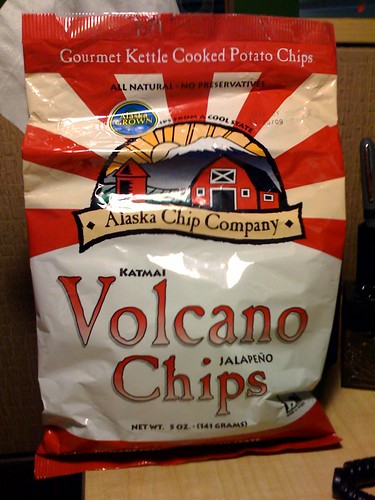
The essay gets even better when you replace the word “miner” with “minor” and my thoughts on the actual product follow it.
The Alaska Chip Story
People in the Matanuska Valley have long known the secret of Alaskan potatoes. Potatoes so full of crunch they aren’t grown, they’re mined [1]. Potato miners don’t seek the spotlight, you won’t see them in many headlines, they are searching for a potato so elusive, so robust, that many said it was just a story told by old sourdoughs[2, 3]. Some laughed at the potato miners, mocking their epic quest for a spud known only as “Thunder Crunch.”
For others, just hearing the words Thunder Crunch fills their hearts with fear. They blame the many earthquakes, aurora borealis and other phenomena in the Northland on these hearty vegetables [4, 5]. Some even said searching for the legendary spud should be banned, due to the many dangers involved.
In the spring of ’03, legend became reality when deep below the Matanuska Valley a rumble was heard that would forever change the way we think of chips. Thunder Crunch was discovered by the miners, and those unsung heroes have brought them to the surface to be enjoyed by everyone.
There are still those who fear the legend, but for the brave souls willing to reap the rewards of the potato miner, life just got a little better [6].
[1] Does “crunch” imply that they grow in caves, or tens of feet below the surface?
[2] This is a really great sentence.
[3] WTF is a “sourdough”? Is this really how they talk in Alaska?
[4] I thought there was only one Thunder Crunch.
[5] I thought potatoes were “tubers,” not vegetables.
[6] I disagree. Read on to see why.
The first thing you will notice about this product is its uncanny resemblance to a bag of Cape Cod Chips. I have not researched this further, but this can only mean two things: There is a chip company out there that only has factories in quirky geographic locations, or the Alaska Chip Company loves plagiarizing.
Any way, I was pretty excited about eating something with “volcano” in the name because I was such a huge fan of the short-lived Volcano Taco from Taco Bell. Although Volcano Chips were indeed delicious, the experience of consuming them was not entirely pleasant.
At first bite, they were immediately spicy, with a prominent and genuine jalapeño taste. The spice wasn’t too intense though, so the only eruption was my nose as the medium spice level caused it to run. I went through half of the 5-ounce bag (if not more) then told myself to go dormant [7].
Five minutes after consumption, there was a chive-like aftertaste in the back of my throat. This was nothing compared to the rumblings in my stomach. I was feeling nauseous and had a headache. It was like an instant hangover from the chips. I was actually dizzy. I needed a nap.
I suppose I can’t blame the chips entirely though. Prior to eating them, I had finished a breakfast which had included an “everything bagel,” a donut, some coffee and some hot chocolate.
So there you have it: Volcano chips taste pretty good, and I have terrible eating habits when I am at work.
[7] This is a volcano joke.

2 comments:
i think these are actually called VOLCANO JALAPENO CHIPS, perhaps you missed that because they chose to include the flavor of the chips in small type between the name. good spot for it.
I believe the slang term "sourdough" refers to early white explorers, miners and settlers to the area. The yeast that makes sourdough is apparently pretty easy to preserve as long as you keep it warm and somewhat moist. So dudes would stuff the sourdough yeast close to their bodies (I imagine in their crotches or armpits) and it was pretty much ubiquitous with these sorts of people.
For more information, consult the historical fiction novel "Alaska" by James Michener.
Post a Comment